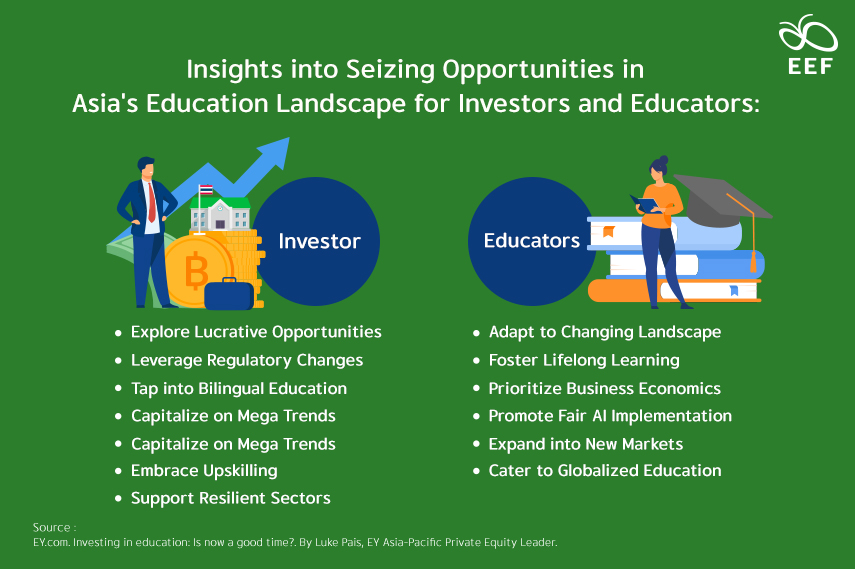
In a recent episode of Money Multiple, Luke Pais hosted an engaging discussion on the thriving education sector in Asia. Joining Luke were Abhinav Mital, Managing Director of Linc Education Services, and Rishi Gajendra, EY Education Sector Leader for Southeast Asia. Together, they explored the trends and opportunities for private capital investors in the rapidly growing Asian economies, driven by factors such as urbanization, a rising middle class, globalization, and technology. The conversation covered a range of topics, including transaction activity, market interests, regulatory changes, the evolution of the K-12 segment, international student flows in higher education, and the influence of EdTech. The podcast provided valuable insights into the dynamic opportunities for investors in the evolving education landscape of the APAC region. And here is a summary of what was discussed in the podcast.
The podcast commenced with Luke warmly welcoming his listeners back to Money Multiple, a platform dedicated to exploring trends, topics, and pathways for private capital investors in Asia to deploy their funds and maximize returns. In this episode, Luke’s focus centered on delving deeper into the exciting and significant opportunities presented by the education sector in Asia, a prime area of interest for private capital investors.

Luke began by providing a concise introduction to Asia, establishing the backdrop for the ensuing discussion. Asia, home to some of the world’s fastest-growing economies and a burgeoning population of 4.5 billion people, experienced various influential megatrends such as urbanization, a rising middle class, globalization of the workforce, and the transformative impact of technology. These factors collectively fueled the escalating demand for high-quality education in the region. Moreover, Luke highlighted the notable evolution within the education landscape, with digital and online learning gaining prominence and the emergence of both regional and global leaders in the early years and K-12 segments. Recognizing the growing emphasis on continuing education and lifelong learning, Luke also acknowledged the challenges faced by governments concerning access, affordability, holistic development, and funding.
When Rishi was asked to provide insights into transaction activity and markets of interest for private capital in the APAC region in 2023, he contextualized his response by presenting pertinent data. In the years 2020 and 2021, the education and EdTech sectors in the APAC region experienced unprecedented levels of total deal volume, reaching approximately US$15 billion. China, India, and Australia stood out as the three largest markets historically.

However, Rishi observed that regulatory changes in China had significantly impacted its share of the deal volume, diminishing it to approximately one-third over the past two years. Beyond the prominent markets, Rishi also highlighted Vietnam, Malaysia, and Singapore as other intriguing destinations for investors. He drew attention to the emergence of multi-sector education platforms in Vietnam, private equity investments in universities and K-12 schools in Malaysia, and the well-developed education market in Singapore.
Captivated by the enticing opportunities in the region, Luke turned to Rishi to gain a deeper understanding of recent regulatory changes in the APAC region. Rishi shed light on the pivotal role regulations and policies play in shaping the education sector, highlighting the notable example of China’s ban on for-profit operations in after-school tutoring. Furthermore, he elucidated how Vietnam and Malaysia have opened all education sub-sectors to foreign investor participation and for-profit operations. In contrast, Indonesia historically imposed restrictions on for-profit K-12 and higher education, though recent changes now permit foreign branch campuses in special economic zones. Rishi also underscored the significance of India’s National Education Policy and the guidelines issued by the education ministry, which aim to regulate the practices of EdTech companies to ensure fairness.
Shifting gears to the different segments of education, Luke asked Rishi about the evolution of the K-12 schools segment and the growth opportunities within it. Rishi explained that historically, growth in Asia-Pacific was driven by premium international schools targeting expatriate families and wealthy locals. However, he noted a recent shift towards bilingual and dual-curriculum schools operating at mid-market price levels. These schools targeted mid to upper-income locals seeking globalized education for their children and a pathway to overseas higher education.
Luke then turned to Abhinav to discuss the tertiary segment, specifically international student flows, and their impact on higher education. Abhinav stated that after a tough couple of years, the international student market had resurged in the second half of 2022 and continued into 2023. He mentioned an increase in student numbers in markets like the UK, Australia, Canada, and the US — either higher than or close to the 2019 levels, with a shift in demand from China to the Indian subcontinent and South Asian market. Abhinav also noted that universities were exploring opportunities in Southeast Asia and other regions to establish operations.

The conversation moved on to the impact of the 2022 resurgence on the EdTech sector. Rishi gave a brief introduction to EdTech, saying that it encompasses B2B solutions for educational institutes, K-12 EdTech platforms, and higher education and upskilling EdTech programs. He noted that valuations in the EdTech space had increased during the pandemic but corrected over the past year to what was built up through the COVID-19 years. The K-12 EdTech segment was particularly affected, as the adoption of online classes slowed down with the resumption of in-person learning.

Abhinav further highlighted that while the K-12 sector encountered challenges, there remained growth potential in B2B solutions and higher education and upskilling EdTech. He pointed out that tertiary education had fully embraced the changes brought about by the COVID-19 pandemic, leveraging technology to create a new and rapidly expanding student target market. This market primarily comprised continued learners and professionals seeking further education. Even more, traditional school leavers, both domestic and international students, were benefiting from the enhanced experience facilitated by online delivery methods.
Luke then asked about the key focus areas for EdTech management teams. Abhinav emphasized the importance of building solid business economics and not relying solely on funding and valuations as a source to survive, but as a source to grow. He stressed the need for a value proposition that provides a great experience for students while driving value from the services. Businesses with a cost of customer acquisition below 50% of student revenue have a better chance of survival.

The conversation then turned to the subject of artificial intelligence (AI) in education. Rishi expressed that AI tools, such as ChatGPT, had the potential to enhance the quality of learning and serve as valuable aids for both learners and educators. However, he noted that it was still too early to determine how educational institutions would incorporate these tools into their curriculum plans. Abhinav emphasized the importance of responsible AI use, emphasizing the need to avoid improper usage or granting unfair advantages to students. He stressed that responsible implementation of AI technologies was crucial to ensure fair and beneficial outcomes in the field of education.
In conclusion, Rishi advised that education and EdTech present attractive opportunities for investors, citing the resilience of K-12 platforms and the countercyclical nature of higher education and upskilling. Abhinav echoed the sentiment, emphasizing that education is a sector that can withstand economic turbulence, but careful consideration of underlying business models is essential.
Asia’s evolving educational landscape offers thriving opportunities for investors and educators alike. Rapid economic growth and a population of 4.5 billion people create promising prospects for investors. Educators can deliver enhanced learning experiences and meet the demands of a globalized education landscape. Together, they can contribute to the advancement and transformation of education in Asia. In the following discussion, we will explore the insights for investors and educators navigating this ever-evolving landscape.

Insights into Seizing Opportunities in Asia’s Education Landscape for Investors and Educators:
- Investor:
- Explore Lucrative Opportunities: Discover promising investment avenues in Asia’s education sector driven by rapid economic growth and a population of 4.5 billion people.
- Leverage Regulatory Changes: Seize emerging market potential in Vietnam, Malaysia, and Singapore by capitalizing on regulatory changes, particularly in China.
- Tap into Bilingual Education: Invest in the growing demand for bilingual and dual-curriculum schools in the K-12 segment, attracting mid to upper-income locals seeking globalized education.
- Capitalize on Mega Trends: Harness the influential forces of urbanization, a rising middle class, globalization, and technological advancements to fuel investment in digital and online learning.
- Embrace Upskilling: Recognize the countercyclical traits of higher education and upskilling, offering attractive investment opportunities.
- Support Resilient Sectors: Invest in the education and EdTech sectors, which have demonstrated resilience despite challenges, ensuring long-term profitability.
- Educators:
- Adapt to Changing Landscape: Embrace technological advancements and adapt to the evolving education landscape to deliver enhanced learning experiences.
- Foster Lifelong Learning: Utilize innovative approaches and digital tools to facilitate lifelong learning and meet the diverse needs of learners.
- Prioritize Business Economics: Focus on solid financial strategies to extract value from services and deliver exceptional student experiences.
- Promote Fair AI Implementation: Responsibly integrate AI technologies to ensure fair and beneficial outcomes in education.
- Expand into New Markets: Leverage the surge in international student flows and changing demand patterns to expand operations and establish a presence in new markets.
- Cater to Globalized Education: Meet the demand for globalized education by offering bilingual and dual-curriculum options in the K-12 segment.
The thriving education sector in Asia presents a wealth of opportunities for both investors and educators. With rapid economic growth, a large population, and evolving demand for high-quality education, embracing the changing landscape is crucial. Private capital investors can tap into lucrative avenues by leveraging regulatory changes, capitalizing on megatrends, and supporting resilient sectors. Educators must adapt to technological advancements, prioritize business economics, and cater to globalized education. By embracing these strategies, stakeholders can thrive in Asia’s dynamic educational landscape and contribute to the advancement of education for future generations.
The Equitable Education Fund (EEF) Thailand is a prominent organization in Thailand that plays an active role in empowering individuals with the essential skills and competencies required to succeed in a rapidly changing world. One of their noteworthy initiatives, the Community-Based Innovation and Career Development Scholarships, focuses on empowering individuals and promoting innovation as a means to address education and employment disparities. These scholarships specifically target exceptional students pursuing high vocational education, aiming to provide them with the necessary support and resources. In addition to offering scholarships, the EEF engages in research, forms partnerships, and assists individuals in need. Through these efforts, the EEF strives to create equal opportunities for people of all ages, from children to youth and adults, thereby contributing to the overall advancement and transformation of the educational landscape in Thailand.
Source:
EY.com. Investing in education: Is now a good time? By Luke Pais, EY Asia-Pacific Private Equity Leader. https://www.ey.com/en_sg/podcasts/moneymultiple/2023/03/episode-2-investing-in-education-is-now-a-good-time

